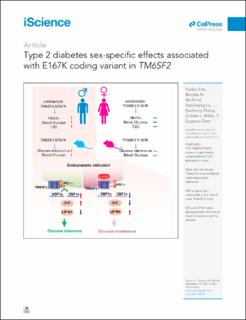Type 2 diabetes sex-specific effects associated with E167K coding variant in TM6SF2
Fan, Yanbo; Wolford, Brooke N.; Lu, Haocheng; Liang, Wenying; Sun, Jinjian; Zhou, Wei; Rom, Oren; Mahajan, Anubha; Surakka, Ida; Graham, Sarah E.; Liu, Zhipeng; Kim, Hyunbae; Ramdas, Shweta; Fritsche, Lars; Nielsen, Jonas B.; Gabrielsen, Maiken Elvestad; Hveem, Kristian; Yang, Dongshan; Song, Jun; Garcia-Barrio, Minerva T.; Zhang, Jifeng; Liu, Wanqing; Zhang, Kezhong; Willer, Cristen J.; Chen, Y. Eugene
Peer reviewed, Journal article
Published version

Åpne
Permanent lenke
https://hdl.handle.net/11250/3042895Utgivelsesdato
2021Metadata
Vis full innførselSamlinger
Sammendrag
The rs58542926C >T (E167K) variant of the transmembrane 6 superfamily member 2 gene (TM6SF2) is associated with increased risks for nonalcoholic fatty liver disease (NAFLD) and type 2 diabetes (T2D). Nevertheless, the role of the TM6SF2 rs58542926 variant in glucose metabolism is poorly understood. We performed a sex-stratified analysis of the association between the rs58542926C >T variant and T2D in multiple cohorts. The E167K variant was significantly associated with T2D, especially in males. Using an E167K knockin (KI) mouse model, we found that male but not the female KI mice exhibited impaired glucose tolerance. As an ER membrane protein, TM6SF2 was found to interact with inositol-requiring enzyme 1 α (IRE1α), a primary ER stress sensor. The male Tm6sf2 KI mice exhibited impaired IRE1α signaling in the liver. In conclusion, the E167K variant of TM6SF2 is associated with glucose intolerance primarily in males, both in humans and mice.
